Save $40 on your initial consult with a TNI Dietitian!
Talk to a real Dietitian for only $99: Schedule Now
This post contains links through which we may earn a small commission should you make a purchase from a brand. This in no way affects our ability to objectively critique the products and brands we review.
Evidence Based Research To fulfill our commitment to bringing our audience accurate and insightful content, our expert writers and medical reviewers rely on carefully curated research.
Read Our Editorial Policy
Everyone loves that fresh and minty feeling after a swish of mouthwash—but some are filled with harmful ingredients and many “natural” ones simply don’t work, keeping your coffee breath alive and aggressive.
If you’ve ever struggled to find that perfect non-toxic yet still effective mouthwash, we’ve got you covered—yay for fresh breath without compromising your oral health!
After a rigorous vetting and testing process, we’ve determined the five best natural and non-toxic mouthwashes on the market today—let’s dive in.
Here’s a quick look at the top mouthwashes we recommend, but keep on reading for more details about what we loved about each one—and also what we didn’t.
Our favorite pick is The Natural Dentist Healthy Gums Mouth Rinse, but the other four are also excellent choices depending on your needs.
Whether you want the best bad breath-fighting mouthwash (that would be Twice Oral Wellness Immunity Rinse), one for whitening (Essential Oxygen Certified BR Organic Brushing Rinse), or plastic-free options (Boka Tablets and Canary Concentrate), we’ve got you covered.
Plus, you won’t find any potentially harmful ingredients in these natural mouthwashes, like alcohol, SLS, or artificial dyes.
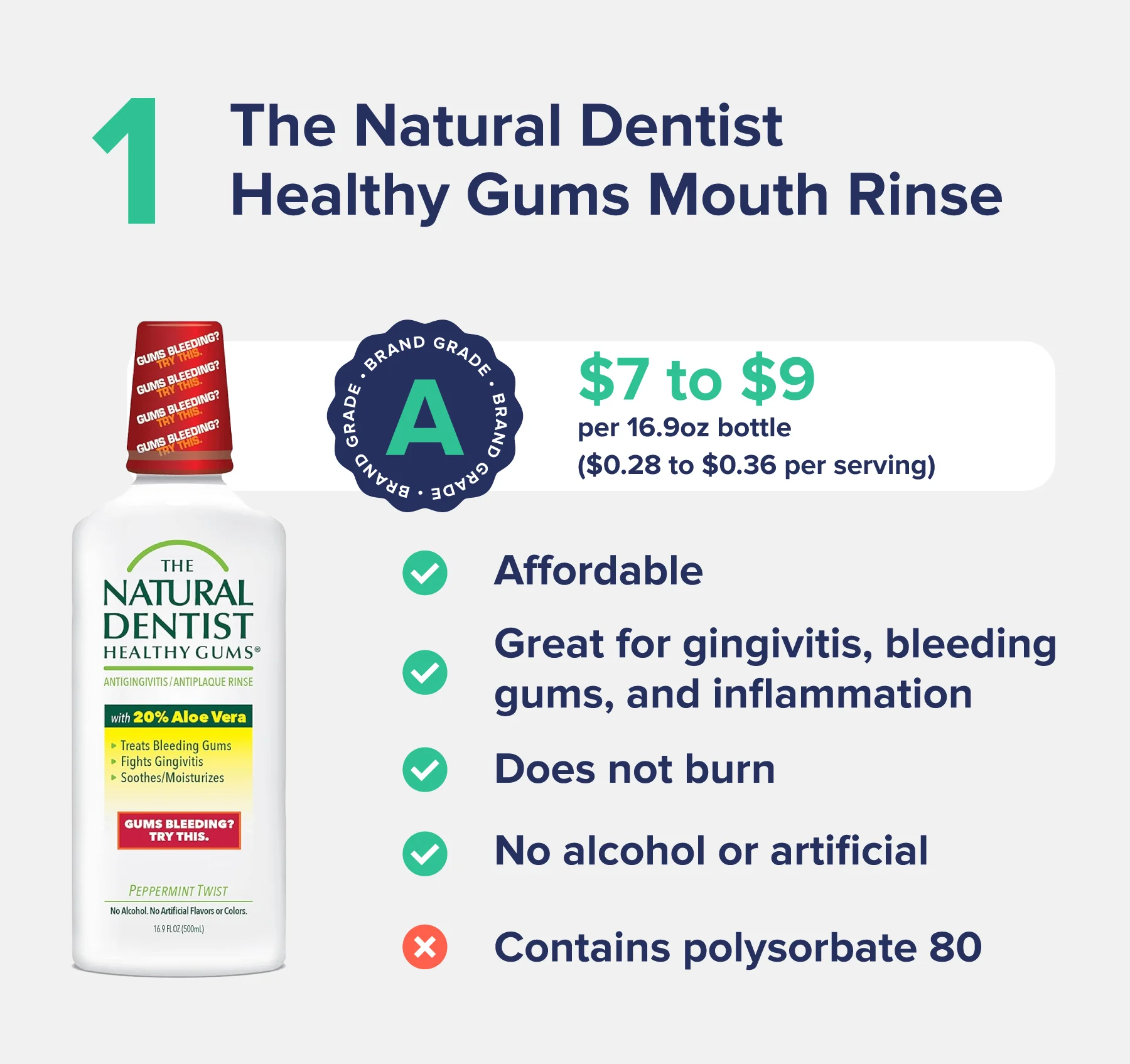
Review Summary: A
Our top pick for the best mouthwash, with excellent ingredients for supporting oral health and fighting inflammation.
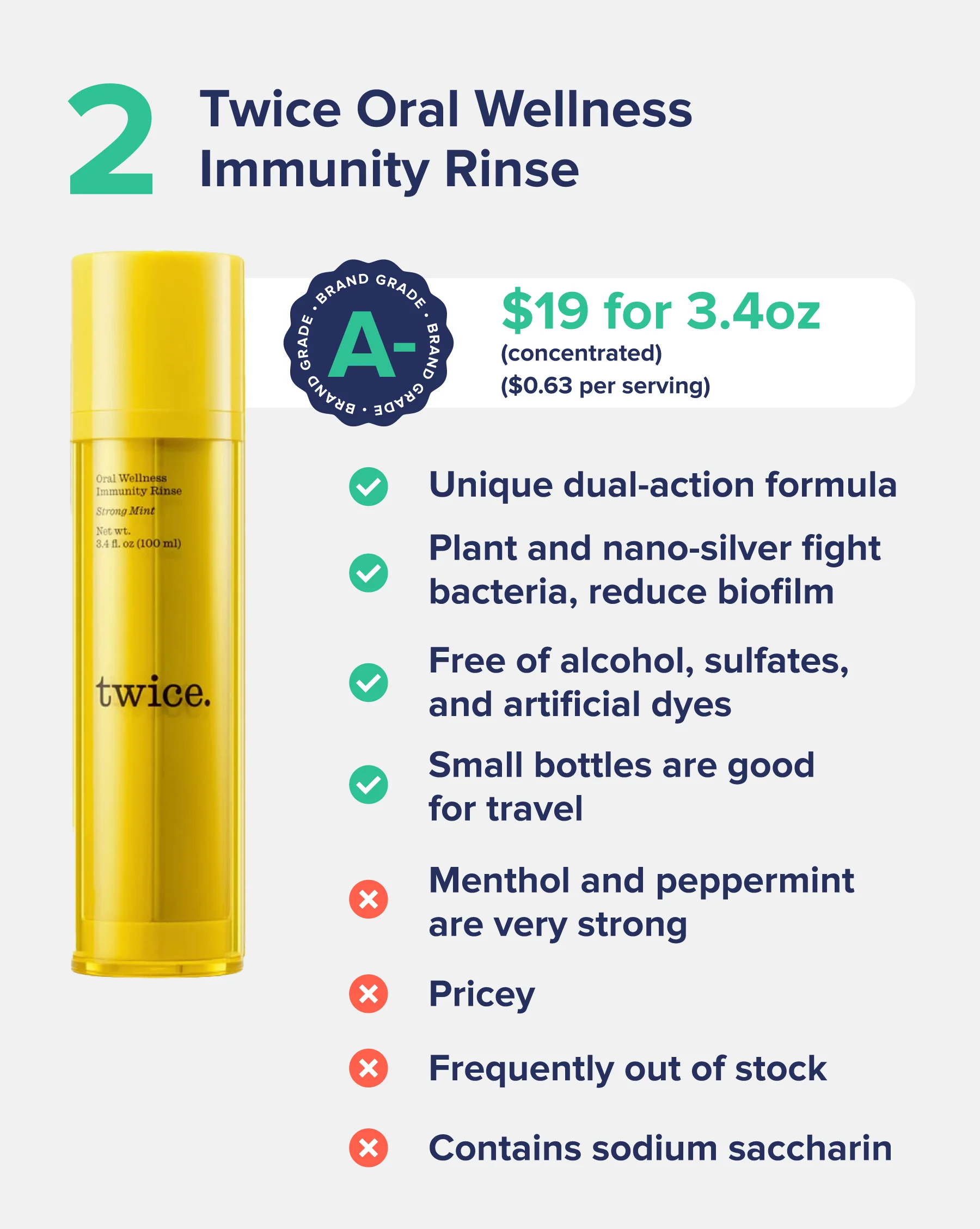
Review Summary: A-
A unique dual-action formula that targets oral immunity, bad breath, and microbiome health. However, the addition of an artificial sweetener brought the score down a bit.
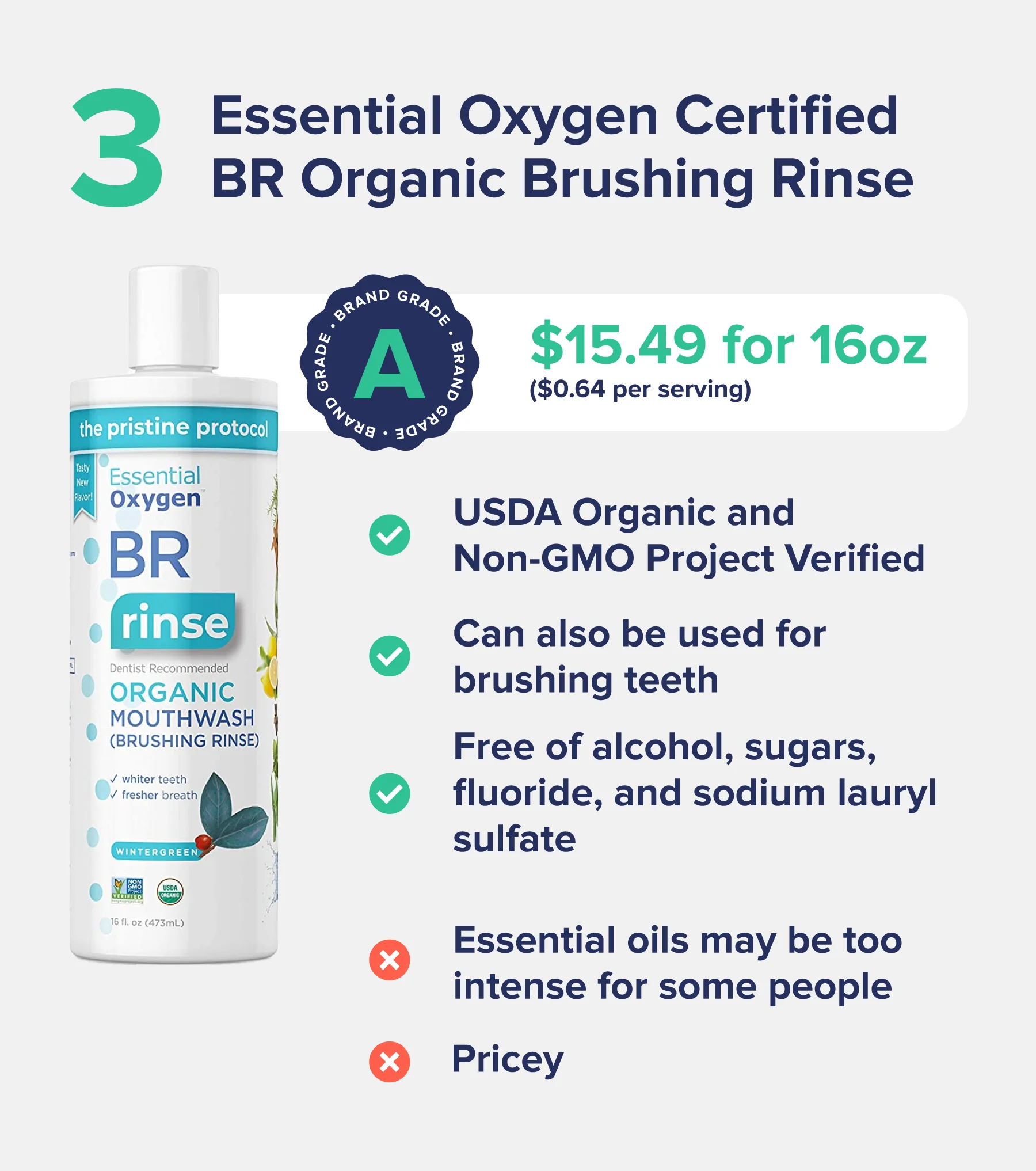
Review Summary: A
A great choice for a natural whitening mouthwash with simple and organic ingredients. This one was very effective, both for freshening breath and whitening teeth.
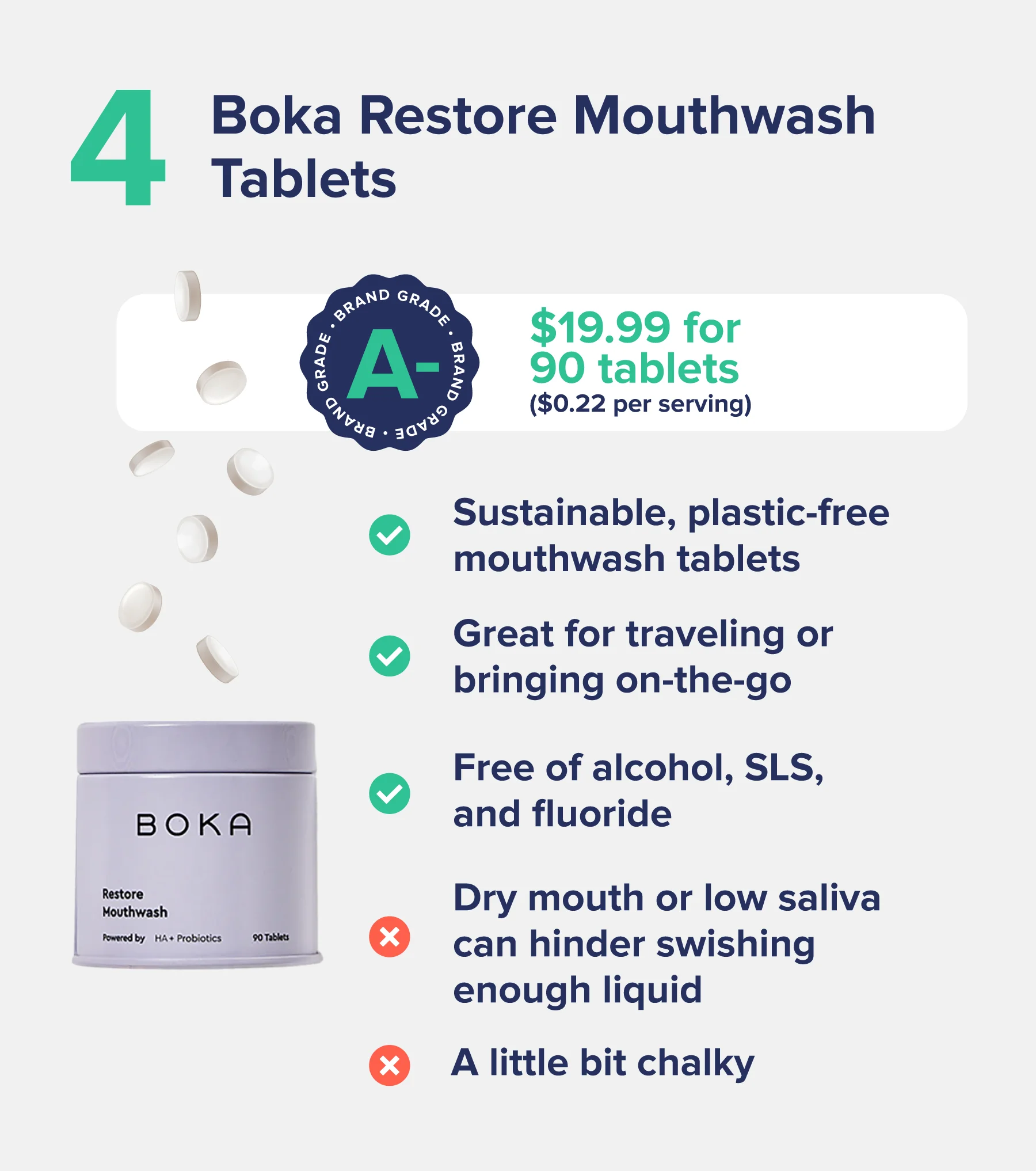
Review Summary: A-
An environmentally friendly approach to mouthwash, these tablets mix with saliva to form an effective breath-freshening mouthwash. However, the effects didn’t last too long.
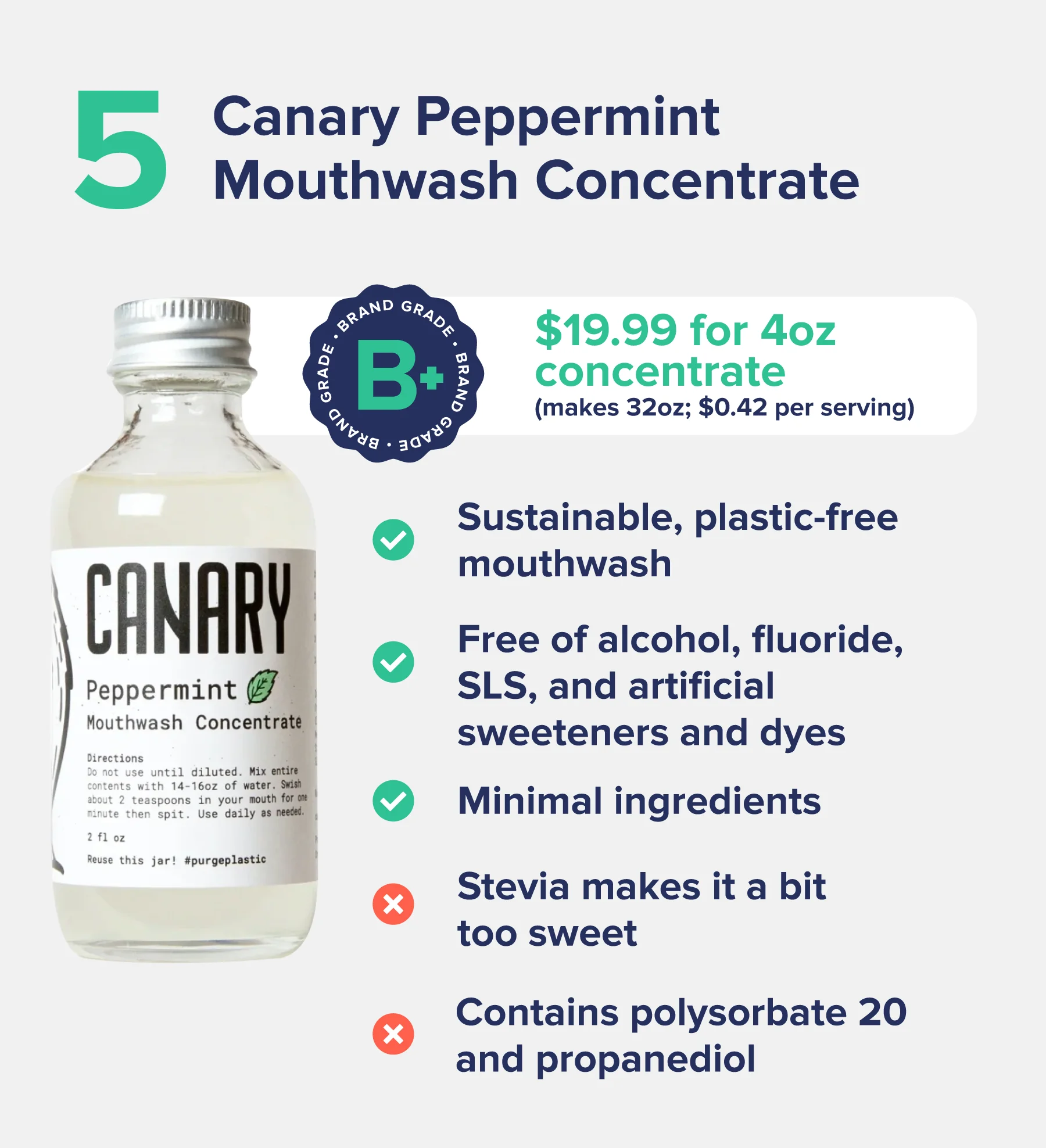
Review Summary: B+
Another sustainable, plastic-free option, Canary provides liquid concentrate to mix with water—but it’s a little on the sweet side.
Here at The Nutrition Insider, we don’t recommend just any old product off the shelf—and we certainly aren’t swayed by free products or monetary incentives.
We put a lot of thought and care into the products and brands we recommend—in fact, we have an entire library of trusted brands that we’ve thoroughly vetted here—to help take the guesswork out of your shopping experience.
Here’s a quick look at the selection criteria we used when evaluating mouthwashes and the testing methods utilized to determine the best of the best.
When it comes to mouthwash, you may think that the only criterion is whether or not it works.
Although killing off your coffee breath is undoubtedly important, we also need to address the ingredients that are in each mouthwash (or, more crucially, not found in them), the price point relative to bottle size, how it tastes, if it burns, and user experience or accessibility.
Ingredients are not only important when it comes to food and supplements. Conventional mouthwash can actually be loaded with ingredients that can be harmful to your mouth and gums—the opposite of what we want in our oral hygiene routine.
Some of the key mouthwash ingredients that we do not want to see include:
While most dentists recommend antibacterial mouthwashes, emerging research suggests that mouthwashes that kill bacteria are not as beneficial as we once thought. Unfortunately, many mouthwashes use some sort of antibacterial agent, with the most common being alcohol.
Killing off all of the bacteria—good and bad—in your mouth can also deplete oral nitrate-reducing bacteria. This leads to reduced nitric oxide availability—a vasodilating compound linked to better heart, vascular, respiratory, and immune health.
Plus, alcohol can cause dry mouth, burning, and pain. It may even increase the risk of oral, throat, and neck cancers.
Essential oils (like menthol, spearmint, thymol, and eucalyptus) are often added as natural antimicrobial alternatives to alcohol and antiseptic ingredients. While these natural plant oils are also antibacterial, they seem to selectively remove harmful bacteria without disrupting the beneficial oral microbes.
As a quick aside, although fluoride does have its benefits in preventing cavities, we chose fluoride-free mouthwashes due to the potential downsides of using it in dental care. The compound nanohydroxyapatite (found in the Boka Restore Mouthwash Tablets) has been proposed as a safer alternative with comparable effects to fluoride in preventing cavities.
For more details about the downsides of conventional mouthwashes, check out our article “Is Mouthwash Bad for You?”
This one is pretty straightforward—we’re simply checking to make sure that the price is not astronomical compared to what you’re getting.
No matter how great the ingredients and price point are, it doesn’t really matter unless the mouthwash actually works, right?
We’ve got you covered here—both from personal experience and reading dozens of pages of reviews to make sure the mouthwash is doing what it says it’s going to do.
We tested each mouthwash at least once per day for three days, choosing to test it out after morning coffee was consumed for the ultimate breath-freshening test.
Taste is important when it comes to mouthwash—anything too minty, too sweet, or too chemical-tasting is hard to swish around for too long.
We also tested for effectiveness (namely, did it work to freshen breath?).
Mouthwash is pretty straightforward, but we wanted to assess the overall user experience regarding things like ease of taking off the seals or caps, easy-to-follow instructions, or anything that hindered accessibility.
Even after reading through our testing methodology, you might still be left wondering why you should trust our product reviews.
The Nutrition Insider prides itself on being a neutral third party that only reviews products we believe in.
Our team consists of doctors, registered dietitians, and food experts (such as yours truly) who are dedicated to providing you with the best science-backed takes on the latest food and nutrition trends and health products.
Beyond just providing research-driven product reviews, our goal is to educate and inform you––our health-conscious audience––of the best practices across the health and wellness spaces, including dieting principles, supplement buying guides, trends, and new developments in the industry, etc.
Our content dives deeper than surface-level branding and marketing claims, providing you with value-added “industry insider” information.
For more information about how The Nutrition Insider conducts its reviews and other aspects of our business, please feel free to read our Editorial Policy.
Now, the moment you’ve been waiting for—our top five picks for the best mouthwash. We’ll start with the overall best pick, followed by choices for the best mouthwash for bad breath, whitening mouthwash, mouthwash tablets, and a concentrated, plastic-free option.
Our top pick for the best mouthwash is The Natural Dentist Healthy Gums Mouth Rinse, as it’s affordable, effective, and beneficial for many oral conditions.
Notably, this mouthwash can help with bleeding gums, gingivitis, gum inflammation, and oral wound healing.
While there are some minty and cinnamon flavors, they are not overwhelming and do not burn at all.
In fact, it’s gentle enough that this mouthwash is recommended for chemotherapy patients who have oral sores and side effects associated with cancer treatments.
The only thing keeping it from an A+ is one potentially questionable ingredient.
A
While most of the other ingredients are innocuous, not much is known about polysorbate 80 in oral care products. It’s commonly used as an emulsifier and surfactant, but there are some concerns about it being contaminated with other unwanted chemicals.
This mouthwash does not burn but still has a notable cinnamon and peppermint flavor, which helps to freshen breath without causing irritation.
It leaves a pleasant aftertaste and helps to freshen your breath for a couple of hours.
Plus, The Natural Dentist mouthwash is highly effective for reducing gum bleeding, puffy gums, and irritation.
As The Natural Dentist does not sell their products on their website, the price ranges depend on which retailer you purchase from.
You can find it at most major drugstores (CVS, Rite-Aid, Walgreens, etc.) as well as on Amazon, where the prices range from $7 to $9 per 16.9oz bottle ($0.38 / Fl Oz). If you use the standard mouthwash serving size of about 20mL once per day, this bottle would last you about 25 days.
Twice Oral Wellness Immunity Rinse is your best bet for a mouthwash when you need to fight bad breath.
Twice Immunity Rinse is one of the more unique mouthwashes we’ve come across. It comes in a bright yellow cylindrical bottle with the mouthwash split into two distinct sides that you pump out, making it hard to forget.
It has great effectiveness and flavor—which might be too intense for some—but overall, it is excellent for fighting bad breath and, over time, can help reduce gum inflammation.
We also love this mouthwash for its abundance of herbal and botanical ingredients designed to support oral immunity, fight bad breath, balance the oral microbiome, whiten teeth, and calm gum irritation.
Overall, we thought this mouthwash was the best at freshening breath—but, as you’ll see, there are a few downsides.
A-
While there are quite a few other ingredients, they are mainly for emulsification or preservation purposes and are considered non-toxic in personal care products like mouthwash.
However, one ingredient that we do not love is sodium saccharin—a salt form of the artificial sweetener saccharin.
While we are rinsing our mouths with this product and not drinking it (don’t swallow your mouthwash, people!), we are willing to give a slight pass here—although we did drop down the overall grade.
But, we would love it if Twice would switch this sweetening ingredient out for something else—or just eliminate it altogether (do we really need sweetened mouthwash, after all?).
There is no doubt that menthol and peppermint are present in this mouthwash. A little bit goes a long way here—just three to four teeny squirts and a 15-second swish will do the job.
If you are sensitive to menthol (that super-minty flavor), you may want to dilute the mouthwash first by adding it to a cup of water and swishing for 30 seconds—I’m telling you, it’s strong!
I really enjoy a minty-fresh feeling from using mouthwash, so the menthol and peppermint didn’t bother me, but I could see how it might be a bit too intense for other people.
I also think the effectiveness of Twice Oral Wellness Rinse is top-tier—it quickly eliminated undesirable coffee breath and worked well for a simple midday mouth refresh.
Plus, it lasted quite a while—my mouth felt fresher for a few hours.
At $20 per bottle, Twice is a costly mouthwash brand—and the bottle size is substantially smaller, at 3.4oz.
However, it’s more concentrated, and you use only a fraction of the amount compared to regular mouthwash bottles, leading to a 30-day supply of $0.22 per serving.
Another piece to note: this product is popular and is often out of stock.
Essential Oxygen Certified BR Organic Brushing Rinse is another top mouthwash on the market today, especially for people looking for whiter teeth.
This mouthwash has a relatively simple ingredient list, including seven organic essential oils, aloe leaf juice, and hydrogen peroxide.
The hydrogen peroxide is what makes this a whitening mouthwash—and it actually starts working within just a couple of days!
A
The Essential Oxygen Brushing Rinse passed with flying colors on both taste and effectiveness.
While it does have seven essential oils, I did not find it to be overbearing—but some people who are sensitive may feel that it burns a tad.
It’s also highly effective at freshening breath and also at whitening teeth. Even after just a few uses, I could see whiter teeth starting to come through.
A couple of minor downsides are that the mouthwash is recommended to be used before brushing your teeth, which may be hard to remember, and for 60 seconds at a time, which is a bit long.
Also, the foil seal on the top of the bottle was very difficult to remove—I ended up having to poke it with scissors and cut it off.
Overall, I really liked this mouthwash and would recommend it to anyone not sensitive to essential oils.
At $15.49- $10.01 for 16oz (473mL), this mouthwash is on the expensive side. If you use the standard mouthwash serving size of about 20mL at once per day, this bottle would last you about 24 days ($0.64 per serving).
Boka Restore Mouthwash Tablets are the perfect choice for anyone looking to cut plastic out of their oral care routine or ensure that they can always have fresh breath on the go.
This unique product is a chewable tablet that, once mixed with your saliva, becomes a mouthful of mouthwash—simply chew, swish, and spit like usual.
We also love the inclusion of nanohydroxyapatite—a safer alternative to fluoride that fights cavities and remineralizes teeth—and probiotics to support the oral microbiome.
While it is pricey ($20 per container), the 90 tablets will last you three months with once-daily use.
A-
As my first experience with a mouthwash tablet, I didn’t have high hopes—but I was pleasantly surprised!
The Boka mouthwash tablets crushed easily in my mouth and quickly turned into a mostly liquid rinse that I was able to swish around my mouth.
However, as many a dentist has told me, I have exceptional saliva-producing abilities (TMI?), so I can see how people with dry mouth or low saliva output may have trouble getting enough liquid to swish it around.
Another potential issue could be that it may be difficult for some people to remember not to swallow it if they’re running on autopilot (after all, the next step after chewing is typically swallowing).
Plus, it remained a bit chalky and never became a true liquid, as I couldn’t get all of the particles to dissolve fully.
As far as breath freshening goes, it did work better than I thought it would, but the effects did not seem to last as long as the others.
Lastly, the taste was good (a combination of mintiness and herbs), but it wasn’t overpowering and definitely did not burn.
This one has a higher up-front price, at $20.00 for 90 tablets. However, most of the other mouthwashes will last you less than a month, while this will get you three months with a once-daily usage. At $0.22 per serving, that’s not too bad!
Lastly, Canary Peppermint Mouthwash Concentrate is a great choice for an environmentally friendly approach to mouthwash—no humongous plastic bottles are wasted here.
Instead, Canary provides you with a glass bottle reminiscent of an old-school milk jug with two small concentrated mouthwashes that you mix with water in the jug.
While we applaud their sustainability efforts, some downsides were an overly sweet flavor and moderate breath-freshening ability.
B+
While the main ingredients are great, some of the ingredients found in lesser quantities may have some issues. We found that propanediol may be linked to skin irritation and endocrine disruption, although the evidence is low. And, like polysorbate 80, polysorbate 20 has the potential to be contaminated with other chemicals.
This mouthwash did a pretty good job at freshening my breath, but the taste was light on the mint and heavy on the sweet due to the stevia.
While this might be good for people who prefer a less minty mouthwash, I tend to like the fresh, minty aftertaste. It wasn’t cloyingly sweet, but you can definitely tell that there is stevia in it.
Plus, I found that it did not last as long as some of the other mouthwashes in terms of breath freshening.
Each 2oz concentrated bottle makes 16oz of mouthwash (and you get two bottles of concentrate per order), so the $19.99 price tag isn’t too expensive compared to other natural mouthwashes. This comes out to about 47 doses of 2mL or $0.42 per serving.
Although it may seem straightforward, picking a mouthwash off the shelf isn’t a simple task. When you consider therapeutic ingredients, fluoride or no fluoride, alcohol or no alcohol, effectiveness, and price, you may be standing in the mouthwash aisle all day.
Based on our vetting and testing, we determined that The Natural Dentist Healthy Gums Mouth Rinse was the best overall pick for reasons including great ingredients, reasonable price, and gentle ability to fight bacteria and support gum health.
We also loved Essential Oxygen Certified BR Organic Brushing Rinse for its whitening action, Twice Oral Wellness Immunity Rinse for its excellent breath-freshening capabilities, Boka Tablets for a mouthwash tablet that uses nanohydroxyapatite, and Canary Concentrate for a plastic-free mouthwash.
Effective mouthwashes will kill off bad oral bacteria without harming beneficial bacteria. Alcohol-based mouthwashes will kill off both the good and bad, making them less effective in the long run for supporting oral health. Conversely, mouthwashes using essential oils are thought to only target harmful bacteria, leading to fresher breath and a healthier oral microbiome.
Essential oils, like those derived from eucalyptus, tea tree, cloves (eugenol), or thyme oil (thymol), can kill bacteria in the mouth naturally. Coconut oil is another antimicrobial ingredient commonly used in natural oral care products.
It’s best to use mouthwash after brushing your teeth. Many brands recommend waiting 20 to 30 minutes after brushing your teeth before using mouthwash because mouthwash can rinse away therapeutic ingredients from your toothpaste.
Using an alcoholic mouthwash daily could be considered bad for your health.
While it does kill off harmful bacteria, it can also kill good bacteria—including a subset called nitrate-reducing bacteria. Lower levels of nitrate-reducing bacteria lead to reduced nitric oxide availability—a compound linked to heart, vascular, respiratory, and immune health. For this reason, antibacterial mouthwash is linked to worse cardiovascular outcomes.
However, using an alcohol-free mouthwash that is not antiseptic is fine to use every day.
While alcohol is effective at killing bacteria, so are many other compounds and active ingredients, including menthol, essential oils, and therapeutic ingredients like chlorhexidine.
Research from 2021 found that both nonalcoholic and alcoholic oral rinses were equally effective in controlling plaque and gingivitis. The alcohol-containing mouthwash also induced more significant cell damage when compared with the nonalcoholic mouth rinse. Plus, essential oil-based mouthwashes seem to selectively kill off pathogenic bacteria while not harming healthy, nitrate-reducing bacteria. Therefore, the answer is no—alcohol-free mouthwash is not less effective.
When mouthwash burns, that does not necessarily mean that it’s working. The most common ingredients that burn in mouthwash are alcohol and menthol (mint), which can kill off bacteria and freshen your breath.
However, these ingredients are not required for a mouthwash to perform these actions, nor are they always recommended (especially alcohol). Although you may think you need to “feel the burn” in order for mouthwash to be effective, that is not the case. In fact, a burning sensation from mouthwash often means that it is too irritating for you and could cause more harm than good.
Mouthwash should not hurt you—a pleasant tingling may occur from menthol, mint-derived ingredients, or some essential oils (like cloves or tea tree), but a heavy alcohol-based mouthwash that causes a burning sensation is not recommended.